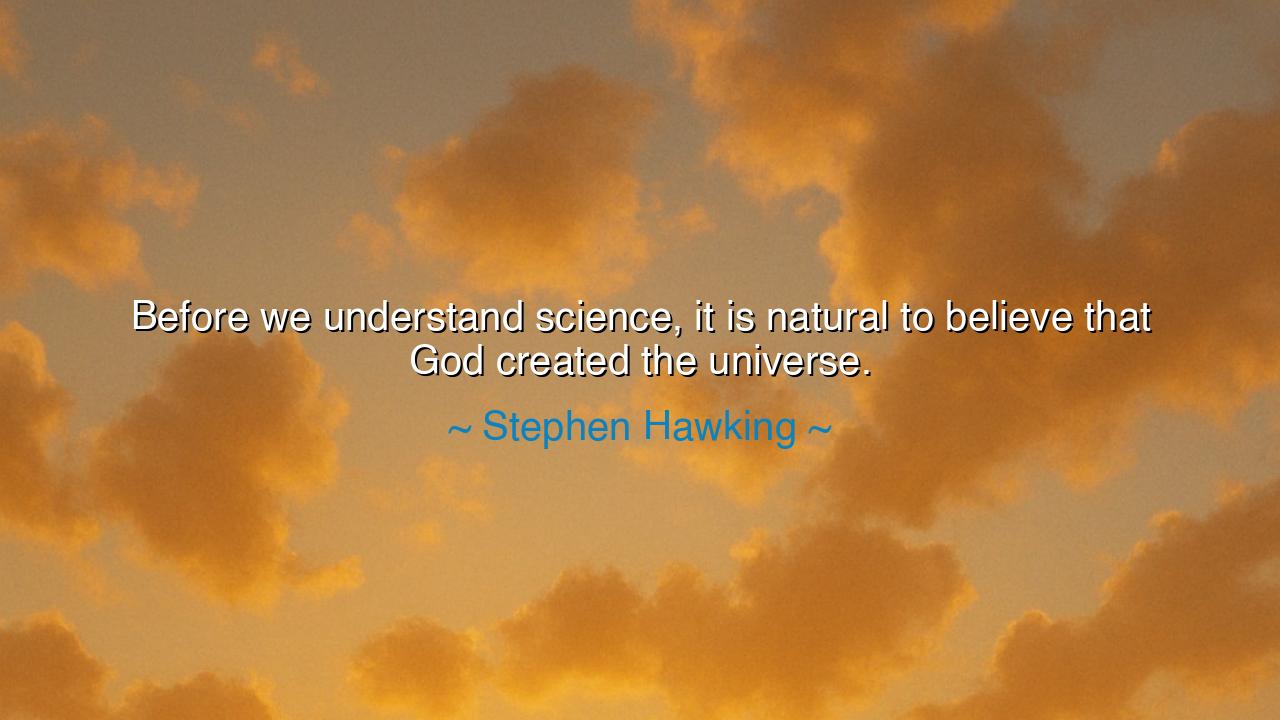
Before we understand science, it is natural to believe that God






Hear, O wise ones of tomorrow, for I bring to you the profound words of Stephen Hawking, a man whose mind sought to unravel the very fabric of the cosmos, yet still acknowledged the age-old mystery that has troubled humanity since the dawn of thought: “Before we understand science, it is natural to believe that God created the universe.” These words hold within them the power of truth and faith, and they speak to the essence of human nature—our yearning to understand the universe, our place within it, and the source of it all.
In the days of our ancestors, when the stars above were little more than twinkling lights in the night, and the earth was all that mankind knew, it was natural to seek answers in the heavens. We looked to the gods—in many forms and names—as the creators of all things. From the ancient Egyptians who believed Ra, the sun god, shaped the world, to the Greeks who saw the Olympian gods as the architects of existence, our forebears were driven by the mystery of creation. They saw the order of the universe, the turning of the seasons, the rise and fall of the sun, and they could not help but attribute these wonders to some greater power—a creator whose intentions were beyond mortal understanding.
But science has changed this view. Hawking, the great modern sage, reminds us that once we begin to unravel the mysteries of the heavens, the answers appear less divine and more natural, more bound to the laws of nature. For in the beginning, science did not yet speak; only faith could provide an answer to the why of existence. Yet, with each discovery—of the stars, of the planets, and of the very forces that shape our world—science began to speak in a language of its own, a language that describes the mechanisms of the cosmos without invoking the need for a personal creator. Hawking knew this well; though he sought to explain the universe through the language of mathematics and physics, he also understood that, before this knowledge, belief in a creator was not merely an option—it was the natural conclusion.
Think, O children of this earth, of the tale of Isaac Newton, that great prophet of reason. In his time, the universe was a great clock, wound by the hand of God, ticking away in perfect harmony. Newton himself, though a seeker of truth, did not see conflict between his scientific discoveries and his belief in the divine hand of God. He understood that the universe, with all its precision and order, must surely reflect a grand design. Yet, in his time, science was in its infancy. Newton’s laws of motion and gravitation were revolutionary, but they did not yet reach to the farthest corners of the universe. The idea of a creator was deeply intertwined with the mysteries that had not yet been solved.
As the centuries passed, the great Hawking would come to see the cosmos in a different light. He, too, sought the truth of the heavens, but he did so with a mind sharp as a sword, cutting away the myths that had once clothed the stars. He saw the universe, not as a creation of divine whim, but as a product of natural laws—laws that govern the behavior of the very atoms that make up everything we see. The great Big Bang, he said, might have sparked the universe into being, but it did not require the hand of God to set it in motion. The universe, to him, was self-contained, an elegant dance of energy and matter, governed by rules that could be understood, if only we looked deep enough.
And yet, in his wisdom, Hawking acknowledges something that is far too often forgotten: before we understand the science, it is natural, human, to believe in a creator. For in the face of the unknown, we grasp at answers that provide comfort to our souls. To say that God created the universe is to give us a purpose, a meaning—it places us within a grand story, one that spans the ages, filled with hope and mystery. It is a belief that has sustained humanity through the darkest of times. But as we grow, as we learn, we must understand that the truth of creation may not lie in a single story of a creator, but in the unfolding story of discovery itself.
Thus, the lesson, O future generations, is clear: do not fear the questions that arise when science reveals new truths. Do not shun the divine in the face of reason. For though science may describe the how of the universe, it does not diminish the need for meaning, for purpose, for wonder. Embrace the mystery of the cosmos, for in that mystery, we find God, whether in the laws of nature or the silence of the stars. Seek knowledge, yes, but never lose sight of the wisdom that once guided us: that the quest for truth is not a rejection of the divine, but a continuation of the journey to understand the greatness of the universe.
In your own lives, seek balance. Walk the path of reason, but do not cast aside the faith that has illuminated the hearts of countless generations before you. For the questions you face, the mysteries that lie before you, are both the domain of science and of spirit. The two need not be at odds. In the end, both seek the truth, and the truth, in all its glory, is a light that will guide you across both realms. So, let the wisdom of Hawking echo in your hearts: understand science, yes, but never forget the divine mystery that is as natural to us as the stars in the sky.






AAdministratorAdministrator
Welcome, honored guests. Please leave a comment, we will respond soon